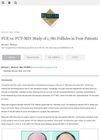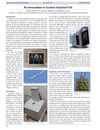 8 citations,
November 2021 in “The Journal of Dermatology”
8 citations,
November 2021 in “The Journal of Dermatology” The article simplifies trichoscopy terms and offers a new diagnostic flowchart.
 8 citations,
March 2020 in “Dermatologic Therapy”
8 citations,
March 2020 in “Dermatologic Therapy” The new hair loss treatment kit was safe and improved hair growth without any adverse effects.
 8 citations,
October 2019 in “International Journal of Dermatology”
8 citations,
October 2019 in “International Journal of Dermatology” The study concluded that combination therapy with topical corticosteroids and hydroxychloroquine or finasteride is effective in treating Frontal fibrosing alopecia in Asians.
8 citations,
August 2019 in “JAAD case reports” Chronic cutaneous lupus erythematosus causes scarring, hair loss, and skin discoloration, especially on sun-exposed areas.
8 citations,
January 2019 in “International Journal of Trichology” Early diagnosis and a combination of treatments, including minoxidil and finasteride, are recommended for managing hair loss in India.
8 citations,
January 2017 in “Indian dermatology online journal” Traumatic anserine folliculosis is a skin condition caused by friction, treatable with topical cream and avoiding trauma.
 8 citations,
July 2016 in “Hair transplant forum international”
8 citations,
July 2016 in “Hair transplant forum international” FUT-MD hair transplants have higher follicle survival rates than FUE transplants.
 8 citations,
March 2016 in “Hair transplant forum international”
8 citations,
March 2016 in “Hair transplant forum international” The new FUE device improves hair transplant safety and efficiency.
 8 citations,
January 2016 in “Journal of Investigative Dermatology”
8 citations,
January 2016 in “Journal of Investigative Dermatology” The research created a model to understand human hair growth cycle, which can help diagnose and treat hair growth disorders and test potential hair growth drugs.
 8 citations,
December 2015 in “PubMed”
8 citations,
December 2015 in “PubMed” Phyllanthus niruri extract may help treat hair loss by promoting hair growth and blocking a hair loss-related enzyme.







